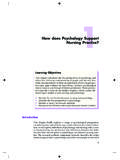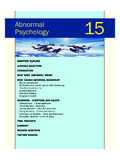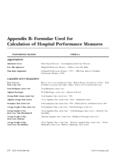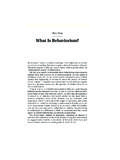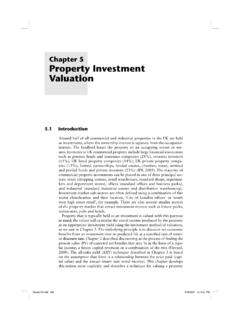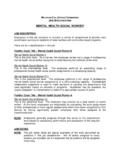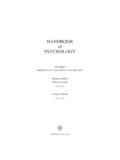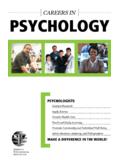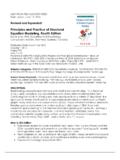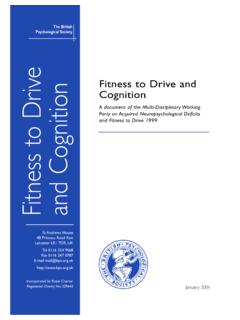Transcription of PSY C21 - Wiley-Blackwell
1 CHAPTER OUTLINELEARNING OBJECTIVESINTRODUCTIONPSYCHOLOGY AND THE LAWThe meaning of forensic The origins of legal psychologyEYEWITNESS MEMORYAn early model of memoryThe strength and validity of the evidenceTHE psychology OF CONFESSIONV oluntary false confessionsInterrogational tacticsCoerced false confessionsTHE psychology OF INVESTIGATIONThe cognitive interviewDetecting lies and deceitOffender profilingCRIMINOLOGICAL PSYCHOLOGYThe Cambridge StudyViolent offendersWorking with offendersFINAL THOUGHTSSUMMARYREVISION QUESTIONSFURTHER READINGF orensic 1/2/05 3:55 pm Page 452 Learning ObjectivesBy the end of this chapter you should appreciate that:nforensic psychology is informed by research in many other areas;nresearch has identified the major influences on the accuracy of eyewitness memory;nthere are major differences between voluntary and coerced confessions;ninterviewers use a variety of techniques to enhance memory retrieval in witnesses;nit is not straightforward to detect lies and deceit;nthere are factors present during childhood that can predict adult offending, and important influences over thelifespan that help to explain and characterize violent conduct;nthere is a variety of treatments used when working with offenders;nforensic psychologists work in a similar way to other is part of our everyday lives.
2 Switch on the television and there will be documentariesabout crime, films about crime and crime storiesin the news. Pick up a newspaper and there will be coverage of local crimes, and articles aboutcrimes of national and international in a bookshop and you will probably find acrime section with novels about crime, true crimestories, books about criminals and books writtenby criminals. Listen to a conversation on the busor in the pub and there is a good chance that youwill hear someone talk about a burglary in theirstreet, or their car being broken into, or a friend scredit cards being the time that Cain killed Abel, crime hasbeen in the news. For centuries before psychologyappeared on the scene, philosophers struggled to understand evil and antisocial acts, while students of jurisprudence wrestled with issues of criminal law and punishment.
3 It was not untilthe turn of the 1900s that psychology was firstapplied to understanding criminal behaviour, and forensic psychology did not really emerge as a speciality until the middle of the forensic psychology has quickly grown in popularity, aided and abetted by several well-known television series. University postgraduatecourses have expanded to include forensic psy-chology, and there is now a range of professionalopportunities for those with the 1/2/05 3:55 pm Page 453454454 Forensic Psychologydiscipline. In their history of forensic psychology , Bartol and Bartol(1999) note that several eminent figures, such as J. McKeen Cattell(1895), Alfred Binet (1905) and William Stern (1910), conductedstudies of the accuracy of memory, drawing parallels with theprecision of real-life eyewitness testimony.
4 Even Sigmund Freudshowed an interest in legal psychology , publishing in 1906 a paper titled Psychoanalysis and the ascertaining of truth in courts of law .But there is little doubt that the most influential figure of the time was the American-based German psychologist HugoM nsterberg (1863 1916). A doctoral student of Willhelm Wundtin Leipzig, M nsterberg met William James at Harvard in 1889,eventually taking a post there in 1897 (Spillmann & Spillmann,1993). While writing on many areas of psychology , often in a controversial manner (Hale, 1980), M nsterberg s major con-tribution to the fledgling discipline of forensic psychology is to be found in his book, published in 1908, On the Witness Stand. Headvanced the view that psychology could usefully be applied toenhance understanding of courtroom issues and particular, M nsterberg drew attention to the psychologist sunderstanding of perception and memory, claiming that psycho-logical knowledge provided insight into the reliability of witnesstestimony (thereby making the case for the psychologist as expertwitness).
5 At the time, M nsterberg s claims for the practical bene-fits of psychology in the courtroom drew fierce attack from thelegal profession (Wigmore, 1909). But his writings have stood thetest of time in anticipating important areas of research, such asthe study of the reliability of evidence, as seen in investigations ofeyewitness memory and confessional EARLY MODEL OF MEMORYThe capacity and fallibility of human memory was one of the firstareas of investigation in psychological research (see chapter 11).Through careful experimental work, several distinguished scholars,including Hermann Ebbinghaus (1850 1909), began to unravelEYEWITNESS MEMORYTHE MEANING OF FORENSIC According toThe Concise Oxford English Dictionary, forensic means Of, used in, courts of law.
6 So, strictly speaking, forensicpsychology is the application of psychology to matters concern-ing the court of s Forensic Psychologytakes just this approach inproposing that Forensic psychology is reflected by any applica-tion of psychological knowledge or methods to the task facing thelegal system (2001, p. 2). This correct usage of the term forensic is similarly reflected in other texts given specifically to forensicpsychology (Gudjonsson & Haward, 1998) or more generally to psychology and law (Bartol & Bartol, 1994; Kapardis, 1997;Stephenson, 1992).But forensic psychology has also come to be used in a muchbroader sense when psychology is associated with any topiceven remotely related to crime, such as the development of antisocial behaviour, the study of different types of offender, andcrime prevention.
7 This improper use of the term forensic has,rightly, met with disapproval (Blackburn, 1996), but its use hasbecome considering the topic of forensic psychology in the broadsense it is helpful to distin-guish between legal psycho-logy which can be thoughtof in terms of Wrightman sdefinition and criminologicalpsychology the application of psychological knowledgeand methods to the study of crime and ORIGINS OF LEGAL PSYCHOLOGYThe application of psychology to the legal arena took place evenas psychology first developed as a university-based academic psychology AND THE LAWP ioneerL. R. C. Haward(1920 98) can rightly be acclaimed as thefirst major figure in British forensic psychology . A clinicalpsychologist by training, Lionel Haward saw the potentialfor psychology to inform legal proceedings.
8 He published onthe topic of forensic psychology in the 1950s well beforeThe British Psychological Society formed the Division ofCriminological and Legal psychology (now the Division of Forensic psychology ) and in 1981 he wrote the classictext Forensic psychology . Alongside his academic work, heappeared as an expert witness in many cases, including theinfamous 1960s trial of the underground magazine M nsterberg(1863 1916) is often referred to as thefounding father of forensic psychology . A German psy-chologist, M nsterberg was invited to America in 1892 by William James to set up a psychological laboratory atHarvard University. M nsterberg s insistence that psycho-logy could be applied to education, industry, and law was variously applauded as inspired by his supporters, or derided as opportunistic by his critics.
9 During the FirstWorld War his political views (as seen in his pro-Germansympathies, and a critical stance that he adopted toAmerican involvement in the war) led to his becoming asocial and academic psychology the application ofpsychology to matters of concern in acourt of psychologythe appli-cation of psychology to enrich ourunderstanding of crime and 1/2/05 3:55 pm Page 454 Eyewitness Memory455455some of the fundamental properties of memory functioning(Ebbinghaus, 1885/1994). One model that emerged from thisearly work described the three memory stages of (i) acquisition(when memories are formed), (ii) retention (holding them in storage) and (iii) retrieval (fetching them from storage).While memory theory hasmoved on from this basicmodel, it is still useful in a dis-cussion of eyewitness into the accuracy of eyewitness testimonyhasfocused on initial observation of the incident (acquisition), theperiod between seeing and recalling (retention) and, finally, givingtestimony (retrieval).
10 Researchers have engaged with a wide rangeof relevant variables over a long period (Goodman et al., 1999;Ross, Read & Toglia, 1994; Sporer, Malpass & Koehnken, 1996),including:nsocial variables, such as the status of the interrogator;nsituational variables, such as the type of crime;nindividual variables, such as witness age; andninterrogational variables, such as the type of role of the expert witnessAs professional chartered or registered psychologists,forensic psychologists are often called upon to providereports on particular individuals for court hearings. Forexample, in a legal context, a forensic evaluation may sub-sequently be used toassist the court in making an appro-priate decision regarding family, civil or criminal matters. Aforensic psychologist might be called to give expert evid-ence in the accuracy of eyewitness memory, or the like-lihood of a false confession, or the reliability of children as witnesses when subjected to certain questioning evaluation of the client provided by the forensic psychologist will often involve characterizing the relation-ship between psychological factors and relevant legalissues.

